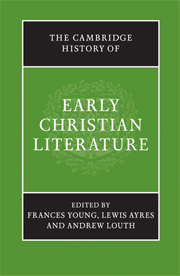Book contents
- Frontmatter
- PART ONE The Beginnings: The New Testament to Irenaeus
- PART TWO THE THIRD CENTURY
- PART THREE FOUNDATION OF A NEW CULTURE: FROM DIOCLETIAN TO CYRIL
- A LITERARY GUIDE
- 21 Classical genres in Christian guise; Christian genres in classical guise
- 22 Arnobius and Lactantius
- 23 Eusebius and the birth of church history
- 24 The fourth-century Alexandrians: Athanasius and Didymus
- 25 Palestine: Cyril of Jerusalem and Epiphanius
- 26 The Cappadocians
- 27 Fourth-century Latin writers: Hilary, Victorinus, Ambrosiaster, Ambrose
- 28 Jerome and Rufinus
- 29 Augustine
- 30 John Chrysostom and the Antiochene School to Theodoret of Cyrrhus
- 31 Cyril of Alexandria
- 32 Hagiography
- 33 Ephrem and the Syriac Tradition
- 34 The literature of the monastic movement
- 35 Women and words: texts by and about women
- 36 Conciliar records and canons
- B CONTEXT AND INTERPRETATION
- Bibliographies
- Index
- Map: The Roman Empire in the late fourth century AD"
- References
29 - Augustine
from A - LITERARY GUIDE
Published online by Cambridge University Press: 28 March 2008
- Frontmatter
- PART ONE The Beginnings: The New Testament to Irenaeus
- PART TWO THE THIRD CENTURY
- PART THREE FOUNDATION OF A NEW CULTURE: FROM DIOCLETIAN TO CYRIL
- A LITERARY GUIDE
- 21 Classical genres in Christian guise; Christian genres in classical guise
- 22 Arnobius and Lactantius
- 23 Eusebius and the birth of church history
- 24 The fourth-century Alexandrians: Athanasius and Didymus
- 25 Palestine: Cyril of Jerusalem and Epiphanius
- 26 The Cappadocians
- 27 Fourth-century Latin writers: Hilary, Victorinus, Ambrosiaster, Ambrose
- 28 Jerome and Rufinus
- 29 Augustine
- 30 John Chrysostom and the Antiochene School to Theodoret of Cyrrhus
- 31 Cyril of Alexandria
- 32 Hagiography
- 33 Ephrem and the Syriac Tradition
- 34 The literature of the monastic movement
- 35 Women and words: texts by and about women
- 36 Conciliar records and canons
- B CONTEXT AND INTERPRETATION
- Bibliographies
- Index
- Map: The Roman Empire in the late fourth century AD"
- References
Summary
Aurelius Augustinus was born on 13 November 354 at Thagaste (now Souk-Ahras) in the Roman province of Numidia, North Africa, son of a small time farmer, Particius, a pagan until near his deathbed, and his Christian wife Mon(n)ica. Gifted in his grasp of Latin literature (Cicero, Sallust, Virgil and Terence he came to know virtually by heart), he studied at nearby Madauros, then at Carthage. Aged seventeen, following the then almost universal custom, he took to his bed and board a Carthaginian girl of low social status, and by her begat a son, Adeodatus, who turned out to be clever but died in adolescence. To his memory Augustine dedicated a dialogue, De magistro (the Teacher) on non-verbal communication. Aged eighteen he was profoundly influenced by Cicero’s dialogue in defence of the study of philosophy, Hortensius, now extant only in fragmentary quotations; Cicero told him that philosophical study (of ethics) was indispensable to finding happiness, which was not achieved by power, honour, wealth or sex. At the time he was already sceptical about his mother’s orthodox Christianity, especially offended by the morals of the Israelite patriarchs and the contradictory genealogies of Jesus. But Cicero moved him towards religion; he opted for the sect of theosophists, who followed the third-century gnostic, Mani, the ‘Manichees’, to whom he remained attached for virtually a decade. Mani reasoned that if God is good and evil is not done away, the supreme power must be less than omnipotent. Augustine thought the argument forceful as an explanation of the problem of evil.
Keywords
- Type
- Chapter
- Information
- The Cambridge History of Early Christian Literature , pp. 328 - 341Publisher: Cambridge University PressPrint publication year: 2004

